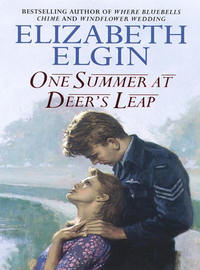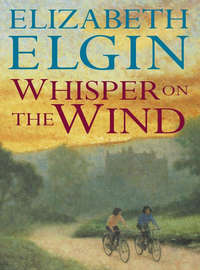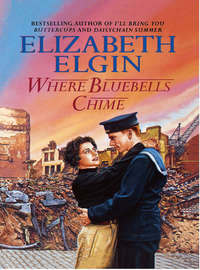
Полная версия
The Willow Pool
‘Heaven help us! What’s to do with the old girl?’ Meg gasped as they tiptoed away. ‘August? Goin’ to Scotland? It’s May!’
‘We stopped going to Scotland before Pa died. We used always to go in August, I believe.’
‘So we are both little girls, and my nanny is talking to Cook – only there isn’t a cook!’
‘Not any more.’
‘I thought she’d be – well – sterner.’
‘She was once. Now she seems to have got smaller and more frail.’
‘And if I take her tea up tomorrow, will she remember me?’
‘I doubt it,’ Polly smiled. ‘I’ll introduce you again, in the morning.’
Childlike, Meg frowned. Frail? Oh, she might be that, but her eyes had been sharp and beady; had taken in every detail of Polly’s little friend.
They had met Polly’s mother then, closing the door of Mrs Kenworthy’s room, a finger to her lips.
‘Mother-in-law is sleeping. Perhaps you could look in on her later?’
Meg picked up the tray from the floor outside the door, asking if there was anything she could do. ‘I came to help, Mrs John, and I’ve hardly done a thing.’
‘Then you can make tea. Use the small pot. We’ll count today as your settling-in day. And when we’ve had tea, will you go with Polly to feed the hens and collect the eggs? I could do with a few for a baked custard for supper.’
‘It isn’t right your mother should work so hard,’ Meg protested as they crossed the courtyard, making for the henhouse. ‘I mean – she once had people to do the housework for her, and a cook, an’ all! Now, she’s got your gran and Nanny Boag to worry about, as well as the war and food rationing. And she’s such a lovely lady.’
‘She is, Meg. I adore her. And things will get easier once you’re into the swing of it. By the way, hens drink a lot of water when they are in the lay; could you fill a bucket at the pump whilst I get the feed?’
There was an iron pump at the trough. Meg lifted the handle up and down; water splashed into the bucket.
‘Ma?’ she whispered, thinking how it had once been for Dorothy Blundell and how her life had ended in the cold and dark of a mucky yard. ‘Oh, Ma.’ She sucked in her breath sharply, then arranged her mouth into a smile as Polly waved from the far archway. ‘Coming!’ she called.
Twelve fat brown hens had run to greet them; drank long at the water trough, then pecked up the wheat Polly threw, feathered bottoms bobbing as they scratched.
‘Oh, they’re lovely!’
‘Don’t get fond of them, Meg. They aren’t pets! Would you like to collect the eggs?’
Collecting eight brown eggs, Meg thought, had been just about the nicest, most countrified thing she had ever done. She had laid them carefully in the empty feed bucket, then placed them in the wooden egg rack in the pantry.
Mind, meeting Polly’s gran had been something altogether different. It might even, Meg thought as she watched big black birds settling in the far trees, have been a disaster, but for the lies. More lies!
‘Meg Blundell, is it?’ asked the old lady whose gnarled hands rested unmoving on the counterpane. ‘How strange. We once had a housemaid called Blundell – Dorothy, her name was. Would you perhaps know of her?’
Her eyes were troubled as she said it, Meg thought, a look of apprehension in them, as if she had needed the stranger who stood at her bedside to deny it.
‘Dorothy? Oh no. Ma was called Hilda.’ Clever of her to have it all worked out – just in case! ‘An’ she wasn’t never a servant; worked in a tobacco factory. She died three months ago.’
‘Ah, yes.’ A small smile – almost of relief, Meg thought – moved the comers of Mrs Kenworthy’s mouth. ‘Just that the name brought it back …’
‘Blundell’s a common enough name around where I was born,’ Meg was quick to answer. ‘There’s even districts of Liverpool with Blundell in them. And me da died at sea,’ she added, to take care of the nameless scallywag. How glib a liar she was becoming – she who’d always prided herself in telling the truth and shaming the devil!
‘I’m very glad to meet you, Meg Blundell, for all that.’
‘And I’m very glad to meet you, Mrs Kenworthy.’ Meg took the offered hand carefully in her own, knowing that hands so swollen hurt a great deal and must not be shaken. ‘And I’m glad I’ve come here to work. It’s so beautiful. You can’t imagine how different it is from Liverpool.’
‘Where, in Liverpool?’
‘Lyra Street.’ And that took care of Tippet’s Yard, Meg thought as she offered the road where Kip’s sister lived. ‘A lot of houses got bombed around there, but I was lucky.’
‘Poor Liverpool,’ the old lady sighed. ‘We had relatives there once. One of them – a cousin – died without issue and left some of his property to my son. John, that is; Polly’s pa. But he got rid of it very quickly; sold it off. I don’t think it brought a lot at auction …’
Sold? But he’d given one – as near as dammit, that was – to her ma, hadn’t he? But for all that, ‘Ar,’ was all she said, because it was best Mrs Kenworthy shouldn’t be reminded about a place called Tippet’s Yard, or about the name signed beside that of Dorothy Blundell. She wouldn’t learn the truth by admitting whose daughter she was, because people like the Kenworthys wouldn’t tell it to her if they thought it would be hurtful. Their sort never did things that hurt.
‘Do you want us to stay for a while, Gran?’
So they talked about Davie, and how many more days it would be until he came on long leave, and Mark too. And Meg told of the thrill of collecting eggs and how lovely it was to live at Candlefold and how awful that That Lot in London could just take your house!
‘But it might have been worse, Meg. We could have had an army unit who would be marching up and down all the time, and sergeants shouting orders and men doing target practice! And those people could have thrown us out completely, don’t forget! I’m grateful they let us keep this old part, and the kitchen garden and the acres. At least we are still here. One caring owner, as they say, for six hundred years. At least we’ve been able to hold on, unbroken. And I’m slipping down in bed! Could you prop me up again – save Mary having to do it?’
So one either side of the high single bed, Polly and Meg lifted her gently, placing pillows at her back and beneath each arm for support.
‘Thank you.’ Mrs Kenworthy opened her eyes. She had closed them in anticipation of pain to come, and there had been none. ‘That’s much better. Awful of me to be so helpless …’
‘No it isn’t,’ Meg defended. ‘An’ I’m used to lifting ’cause Ma was sick for a long time with TB – and I didn’t take it,’ she supplied to save any bother. ‘I’ll come up again – see if you want anything doin’, Mrs Kenworthy.’
She had taken a liking straight away to the woman who lay so still in the lace-covered, old-fashioned bed. So softly spoken, and thanking them gratefully for comfying her in bed. Not like the old girl up the stairs, and her able to walk about and do things for herself had she wanted to! And ringing her bell to summon a long-ago housemaid to do her skivvying!
Had she once, Meg thought now, as the distant trees began to fade into the night, rung her bell and had Dorothy Blundell hurried up the stairs to do the nanny’s bidding? Had Ma carried up nursery meals when the baby in the christening gown was growing up? Mind, Ma wouldn’t have known Polly who, Meg calculated, must have been born after she left. Ma’s replacement would have answered the ringing then!
Poor Ma. Did she leave Candlefold in tears, even though they had cared for her and put a roof over her head? Had she turned for just one last look? And had she longed, even as she left, for the man who was the cause of it all to make an honest woman of her?
Well, Ma had managed without him, Meg thought defiantly. In spite of the shame and having to wear a cheap wedding ring, Ma had kept her end up till she caught TB from a woman she helped nurse, Nell said; probably when she had washed her and laid her out and got her ready for the undertaker. Ma needn’t have died if she hadn’t had to do things like that.
Yet she came up trumps in the end, God love her! Ma it had been who’d enticed her to this place where there were eggs for breakfast and fields and trees and flowers and kindness. And Dorothy Blundell’s daughter was stoppin’ here, no matter how many lies she told! And what was more, she would keep her mouth shut until she found out what she wanted to know and was good and ready to tell them who she really was. And where she had been born!
‘Come in,’ Meg answered the gentle tap on the door.
‘Thought you might be asleep …’
‘Nah, Polly. Been sittin’ at the window, thinking about today, watching it get dark. It’s like another world after Tip – after Lyra Street. Wasn’t I lucky, chancing on Mrs Potter?’ She swung her legs to the floor.
‘But we were lucky, too. Did you ever find the relations you were looking for, by the way?’
‘Weren’t any relations.’ My, but news travelled fast in Nether Barton! ‘Don’t know why I said that. As a matter of fact, I’d just got sick of Liverpool – the mess after the blitz, and so many killed, I mean – that I jumped on the first bus I saw and ended up here. Just a day away from it all, it was supposed to be.’
How many more lies?
‘And you saw the card in the post office window, and asked directions to Candlefold?’
‘Well, the store I worked in had been bombed. I needed a job and, like I said, Ma and me used to talk a lot about livin’ in the country. One day. There was this little place – all in our imagination, mind – with a garden where you didn’t get smuts all over the washing when you hung it out to dry. Only Ma didn’t make it.’ Her bottom lip trembled and she straightened it into a smile. ‘But I made it, Polly! And I’m sure Ma knows I did!’
‘And will you like it here?’
‘You bet I will!’
She would be stoppin’ till they threw her out or, come August, the Government told her to find war work. And she was moving on nowhere without a fight!
‘Mind if I stay and talk? I’ve been writing to Davie, and I always feel so lonely afterwards. Are you very tired, Meg?’
‘No. I’m all keyed up, ’s a matter of fact. Just can’t get over my luck, if you want to know. Been telling myself I’ll wake up in L-Lyra Street, and find it’s all been a dream. Let’s sit on the bed and talk?’
She closed the door; her door! It was giddy-making. Then she carefully folded back the valanced bedspread, kicked off her slippers and offered a pillow to Polly.
‘What’s them flowers called on the bedspread and curtains? They’re ever so bonny. You’ll have to teach me the names of flowers.’
‘Well, those particular ones are delphiniums. They once grew in the garden of the brick house – all shades of blue – but they’ve been overgrown. Potter says it’s going to take him for ever to lick it all into shape when he gets it back again; says Armitage ought to be allowed to take the reaper to the lawns. Says it’s the finest crop of hay he’s seen in a long time! Potter took it badly, losing the main garden, but like I pointed out to him, he had an undergardener then, and an apprentice. They were both called up into the Army, so he couldn’t have coped on his own.’
‘But you help in the kitchen garden? And feed the hens?’
‘And go to the farm for the milk. That’s the first thing I do, mornings. Then I wait for Mrs Potter and Davie’s letter.’
‘You spend your life waiting for letters, or writing them. How long since you saw your feller?’
‘Six weeks. He and Mark got a crafty forty-eight, as they call it – hours, I mean, not days!’
‘Your brother is a real good-looker, isn’t he?’ Meg called back a photograph she’d noticed in the drawing room of a soldier, a small smile on his lips and mischief in his eyes. ‘I’ll bet your Mark can get any girl he wants. Can he dance?’
‘Loves it. Davie, too. When he was last here we went to Preston to a dance, then hitched a lift back as far as Nether Barton. There was a moon, and we walked home the long way round – took us ages and ages.’ She sighed yearningly.
‘Mark wasn’t with you?’
‘No. He said he wasn’t playing gooseberry. He got into civvies as soon as he arrived and said he was going to have a lazy couple of days. Actually, he spent most of the time sawing logs and barrowing manure for Potter! D’you know, it’s lovely sitting here, chatting. Almost like having a sister!’
‘Mm. You’re a good bit younger than your brother, aren’t you?’
‘Four years. It took a bit of time to get me, I suppose. I’m adopted, actually.’
‘Adopted!’ Meg’s eyes opened wide. ‘B-but you don’t seem to mind about it.’
‘Why should I? I’ve known about it since I was old enough to be told. I actually remember when they told me – suppose it was such momentous news it stayed in my mind. Hand-picked, Mummy said I was. A little fair-haired girl.’
‘But aren’t you ever curious, Polly, about where you came from and who your mother is? And you are so like your brother it’s amazing!’
‘Mummy’s my mother. The one who had me is my other mother, but I don’t think about her – we-e-ll, hardly ever. They got me through an adoption society – hope it didn’t upset my natural mother too much, handing me over. A young girl who couldn’t keep me, I think it must have been. No one has ever told me.’
‘And don’t you wonder just a little bit who your father was?’ Meg demanded. ‘I’d want to know.’ By the heck, didn’t she just!
‘Why should I? As far as I’m concerned, the one I look on as my father died when I was little. I’m lucky, being adopted into all this, and I never forget it. After all, my other mother must have been unmarried, and you know what a rumpus that causes! Maybe she knew that the finger would have pointed at me too. Illegitimate babies always suffer, you know. I think that if ever I was to meet her, I’d tell her I was very happy, and thank her for being brave enough to give me up. It must have hurt her a lot.’
‘Oooh, Polly Kenworthy! You aren’t half cool about it. Doesn’t it bother you at all?’ Meg was still taken aback.
‘No. What bothers me is that my parents might have walked on to the next cot and decided on the baby in that one! Don’t you understand? I’m lucky being who I am and having a lovely family. Just think of it – I might never have met Davie. Now that would have been a tragedy! And I’ll tell you something, Meg. If ever I were in the same position – with Davie’s baby, I mean – I wouldn’t let anyone take it from me for adoption!’
‘And could you ever wonder if you might be pregnant?’ Imagine that happening to a Kenworthy, Meg thought wildly. ‘What I mean is – well, have you ever …?’
‘No. Have you?’
‘Heck, no! Mind, I’ve never wanted to, as a matter of fact.’
‘I have, Meg. Oh, we’ve done some pretty heavy petting and there have been times when I’ve thought, what the hell!, but either me or him have managed to count to ten in time!’
‘But what if it does happen? What’ll you do, then?’
‘Hope and pray and count! Oh heck, I’m hungry! Just to even think about me and Davie doing it always makes me want to eat. Shall we go downstairs for a glass of milk, and some bread and jam?’
‘Let’s! And shall we bring it back up here, eh?’
Laughing, they tiptoed to the kitchen.
It was a queer carry-on, Meg thought as she lay awake still, counting as the grandfather clock downstairs struck twice. Her and Polly eating jam and bread sitting crossed-legged on the bed; Polly telling her about the way it was, being in love and about being adopted. Funny, it hadn’t seemed to worry her, but she’d fallen on her feet, she admitted it! Maybe, if Ma had given her up for adoption, Meg frowned, she could have ended up at a place like this too. And even more peculiar was the fact that Polly could be so matter-of-fact about her natural father, though she’d had a long time to get used to being adopted. And who in her right mind would worry about an absent father when she’d ended up a Kenworthy? Meg sighed and turned over her pillow, closing her eyes, breathing deeply and slowly.
Her last thought, before sleep took her, was to wonder yet again which sneaky little sod had fathered her, then shoved off without a scrap of regret. But she would never know now the name of Father Unknown – and was it all that important when Polly was technically in the same boat, sort of. After all, a sneaky little sod must have fathered her too, yet it didn’t seem to bother her! So best she forget it and, like Polly, count her blessings!
Meg surveyed the drawing room she had just cleaned, sniffing the scent that was a mixing of beeswax polish and freshly picked flowers.
The drawing room had been in need of a good clean, come to think of it, but with two old ladies to fetch and carry for, and Polly working all the time she could spare in the kitchen garden, Mrs John had little time for cleaning and it would please her to see what the new home help had done to the white-walled, slate-floored, cosily-old room. Now mirrors and windows shone, woodwork gleamed. She had even polished the copper jugs before she’d crept into the forbidden garden of the brick house and gathered flowers with which to fill them. Smugly pleased with her work, she picked up the photograph of Mark Kenworthy, clucking with annoyance that any man that handsome should be heart-whole and fancy-free.
‘You like my brother, then?’ Polly smiled from the doorway. ‘And it’s drinkings-time in the kitchen. Mummy’s just made tea.’
‘Like him? He’s not a bad-looker, I’ll give you that!’ Hastily Meg replaced the likeness. ‘I don’t suppose you could blame any girl for falling for him.’
‘They do. In droves. Yet he just loves them and leaves them, even though he knows Mummy would like him to marry. After all, he’s twenty-four.’
‘Suppose your ma wants a grandson so the Kenworthys can carry on here. Why did you never grab him for yourself, Polly?’
‘Never gave it a thought – after all, he is my brother …’
‘Yes, but only by adoption, so him and you aren’t blood kin. Hadn’t you ever thought it would be lawful if you had fallen for him?’
‘N-no. All I ever wanted was for him to be my big brother. Falling in love with him never entered my head. And thank heaven it didn’t! Davie is the one I want!’
‘Can see what you mean. Reckon if you had fallen for him, there’d always have been a kind of – of – What’s the word I’m looking for?’
‘Incest?’ Polly raised a surprised eyebrow.
‘That’s it! Would’ve smacked of incest, wouldn’t it, in a roundabout way?’
‘It could have. But he seemed ages older than me when I was growing up. His friends treated me like a little girl – which I was, to them. And Mark always treated me as his kid sister, so the awful situation didn’t arise.’
‘You were waiting for Davie,’ Meg nodded, ‘though you didn’t know it.’
‘Waiting for Davie. It just about sums it up. Waiting for letters, for phone calls if he’s lucky enough to get through, waiting for his next leave; waiting to be twenty-one, then Mummy will know we aren’t going to change our minds about each other. One long wait …’
‘Ar, cheer up, queen! One of these days, when you’re least expectin’ him, he’ll be there on the doorstep!’
‘And if that happens, Meg, I wouldn’t know whether to be glad or sorry. You see, unexpected leave is often embarkation leave! But we’ll take the tea upstairs before we have our own. About time you met Nanny Boag – properly, I mean!’
‘Ar. Prop’ly.’ And hope, Meg thought, that the daft old girl had come back to earth again; hope she wasn’t still Polly’s little friend, whose nanny was in the kitchen gossiping with Candlefold’s cook!
‘Tea for upstairs.’ Mary Kenworthy was arranging cups and saucers on two small trays.
‘So sit yourself down, Mrs John. Me and Polly will take it. Don’t forget I haven’t met Nanny yet – not properly, that is.’
‘Well, she’s fine, today – or she was when I took her breakfast up. Mind, her mood changes can come on without warning, so fingers crossed.’
‘You take Gran’s first,’ Polly said as they crossed the great echoing hall, making for the stone arch in the corner of the room and the stone stairs that rose from it, ‘and I’ll take Nanny’s – prepare her for a surprise, and your second coming! Let’s hope she isn’t in – in –’
‘Cloud cuckoo land again,’ Meg grinned.
‘Fingers crossed!’ Polly smiled back, thinking yet again how lovely it was to have someone her own age about the place.
Nanny Boag had not been in cloud cuckoo land, and anyone, Meg thought as she sipped tea at the kitchen table, could have been forgiven for thinking she ever had!
‘Meg Blundell, is it?’ Emily Boag’s eyes had swept Meg from head to toes. ‘So why haven’t I met you before, miss? You arrived yesterday, at lunchtime. Where have you been until now?’
‘I – I – we-e-ll, we came, and –’
‘Yes! We came yesterday, but you were so busy planning the Scotland trip that Meg and I thought we’d better leave you to it!’ Polly had hastened.
‘Scotland, for goodness’ sake! We haven’t been to Scotland these twenty years past! What on earth are you thinking about, Polly Kenworthy? Is it your time of the month, or are you so head-in-the-clouds over your young man that you can’t think straight? But I’m glad you have come, Meg Blundell. Mrs John could do with some help. My, but I remember when there was a cook and kitchenmaid here, and two housemaids and a parlour maid as well as myself in the nursery. Things have changed since that man Hitler started the war! When it’s all over, I hope they hang him! Maybe, if we hadn’t been so gentlemanly with the Germans at the end of the last war things might have been very different. I shall never forgive the Kaiser for what happened to John. Such a good child; such a gentle young man. It wasn’t right to make a soldier of him, send him to the trenches!’
Shuddering, she had closed her eyes and hugged her cardigan round her, setting her chair rocking in agitation.
‘Oh, thump!’ Polly had gasped. ‘She’s pulled up the drawbridge again!’
For a moment the old woman sat, shoulders hunched. Then she’d opened her eyes, straightened her back and smiled fondly.
‘Off you go then, whilst I drink my tea! Take your little friend with you, Polly dear, and don’t forget to tell her nanny you are going out to play. And remember your bonnets!’
‘Wouldn’t you know it?’ Meg had whispered. ‘Back to square one again! Never mind! Third time lucky. Next time she sees me she might just remember I’m Meg! And don’t look so miserable. Give and take, eh? After all, the old girl doesn’t know she’s doing it!’
‘I’m not so sure,’ Polly had flung as they closed the door behind them. ‘Sure, I mean, that she doesn’t know she’s doing it!’
‘But you said, and your mother too, that you –’
‘That we have to humour her because she doesn’t know where she is or what time of the day it is, most times? Well, sometimes I’m not convinced! Sometimes I think she does know what she’s doing!’
‘But your mother said her mind has gone; that mostly she had shut the world out.’
‘Yes, but is she as senile as she’d have us believe, Meg? Sometimes I think it’s all an act and that she’s putting on Mummy’s good nature so she can still have people running after her like it was the old days! She’s got Mummy fooled and even I accept it, most of the time! But like you saw, she can be as bright as a button one minute, then just go back into her other world as the mood suits her!’ Her eyes had filled with tears and she’d shaken her head impatiently. ‘Oh, don’t take any notice of me! I’m in one of my miserable moods, I suppose, because there wasn’t a letter from Davie this morning! I always get fratchy if he doesn’t write and do peevish things like taking it out on Nanny – who really is senile!’
‘Like you said, Polly girl – sixpence short of a shilling. She can’t help it, I suppose, for wanting to put the clock back. I often wished I could have done the same after Ma died; wished I’d made her go to that sanatorium, charity ward or not!’
‘Meg! Please don’t upset yourself. We’re both of us getting in a tizzy, wishing we’d done something – or hadn’t done or said something. I shouldn’t have said things about Nanny, who can’t help being –’







